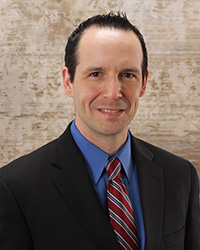Brian E. Blackham Esq. '05

Do you have certain memories about law school that you want to remember?
I have many fond memories from law school, including the time spent with my future colleagues, some of whom would become lifelong friends. Perhaps the quirkiest memory is of attending law school in the old preschool on Paradise Road, where the Boyd School of Law was located for its first four years. It looked exactly like what you would expect a preschool functioning as a law school to look like, and it was awesome! There wasn’t much space, which gave the impression that almost anything you needed was within reach. The restrooms, having been designed for children under age five, remained comically miniature. But the best part, by far, of attending school in the preschool facility was the parking. Even if you arrived late and got a “bad” spot, you were still only a few yards from the classroom. And because I worked during the day and went straight to class after work, it felt good to know that even if I got stuck at work and didn’t exit my car until three minutes before class, I could visit the tiny lavatory before sauntering into class with time to spare.
If you have dinner with a famous lawyer, who would it be, and why?
I would definitely like to have dinner with Abraham Lincoln. It’s unfortunate that Lincoln is viewed as a caricature by so many because he was a truly fascinating person, and formidable trial lawyer. Of course, Lincoln is also consistently ranked as one of our greatest presidents, having led our country through its most difficult time and its bloodiest war. But one of the things I most admire about him is the courage and humility he displayed in creating his “Team of Rivals” cabinet, comprised of former political opponents and persons with differing ideologies. Not only did this novel approach help bring together a divided nation, but it also gave Lincoln a breadth of knowledge and insight he could never have had by surrounding himself with “yes men.” A big part of Lincoln’s genius was that he realized how much he did not know, and more importantly, he understood that, far from being a weakness, the willingness to draw on the superior knowledge and experience of others—even former adversaries—is the mark of true leadership.